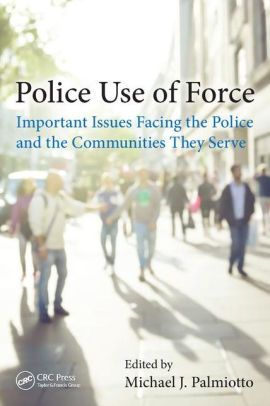|
College of Arts and Sciences |
CJ6655
Selected Topics in Criminal Justice
(Current Issues in Police Use of Force)
Course Syllabus
Last updated February 7, 2018
|
Term - 4, 2018 (March
19 – May 20, 2018)
|
For course syllabus posted prior to the beginning of the term, the
instructor reserves the right to make minor changes prior to or during the
term. The instructor will notify students, via e-mail or Canvas
announcement, when changes are made in the requirements and/or grading of the
course.
|
|
INSTRUCTOR INFORMATION
|
|
|
|
INSTRUCTOR BIOGRAPHY: Professor of Public Administration; Malone D. Wallace Distinguished Faculty 2011. Formerly: Director, TROY 's Florida and Western Regions; Chair, TROY 's Department of Public Administration; Associate Regional Director for Academic Affairs, TROY 's Atlantic Region. Education: Ph.D. in Public Administration, Master of Arts in Criminal Justice, Bachelor of Science in Criminal Justice. Previous teaching: Virginia Commonwealth University; City University of New York; University of Maryland; Central Texas College; Columbia College; Saint Leo College. Professional background: Consultant, training developer and instructor for New York and New Jersey social service agencies. Graduate, FBI National Academy; thirty years law enforcement, personnel management, and training management experience. Certified Government Financial Manager; Executive Committee and former Treasurer, American Society for Public Administration, Section on Ethics and Integrity in Government (SEIGov); Past President: Florida Advisory Council on Military Education; Former Executive Committee member and Treasurer, National Association of Institutions for Military Education Services. Editorial Board member and manuscript reviewer for Public Integrity; Guest Editor for Public Integrity’s Symposium Edition on Military Ethics (2017). Doctoral dissertation examiner and invited Visiting Professor for the University of Pretoria’s School of Public Management and Administration (SPMA).
Course Description:
An examination of a particular subject which is not offered under the normal course offerings. May be repeated for credit. See semester hour limitations under Course restrictions in General Regulations Section.
Course Objectives:
Students will be able to analyze, understand and articulate contemporary police and community relationships and issues related to the use of force.
Learning Outcomes:
1. Examine and explain key issues in the police use of force in contemporary settings.
2. Examine and describe the relationship between police and communities and contemporary issues pressures on police and communities.
3. Define legal issues confronting police relating to force and other community relations issues.
4. Discuss the issues surrounding the reported militarization of police and the role of the Federal Government in that Process.
5. Examine and explain the role of the federal government in monitoring police policies and procedures at state and local levels.
6. Articulate the appropriate training processes and levels for police in the use of force.
7. Discuss police liability issues related to application of police powers and the use of force.
8. Examine the importance of ethics for police.
9. Demonstrate the ability to analyze complex public sector issues, identify potential solutions, and defend courses of action using case analysis methodology.
10. Demonstrate the ability to research complex issues and present information orally and/or in writing.
Entrance Competencies/Course Prerequisites
There are no prerequisites for this course.
TEXTBOOKS AND OTHER MATERIALS REQUIRED:

Palmiotto, Michael J. (2017). Police Use of Force: Important Issues Facing the Police and the Communities They Serve. CRC Press, Taylor Francis Group. ISBN: 978-1-4987-3214-7.
The official bookstore for Troy University is Barnes and Noble (B&N). Students can now order textbooks within Canvas, Trojan Web Express or on the B&N website at http://shoptroytrojans.com/. For further instructions on how to order your course materials go to “How to Order Textbooks”. Students should have their textbook by the first week of class. Not having your textbook is not an acceptable excuse for late work.
Professionally Suggested Readings:
Visit Federal Agency Web pages and articles as assigned/discussed in class.
Attendance Policy
In addition to interaction via Canvas and email contact, you are required to contact the instructor via email by the first day of the term. Although physical class meetings are not part of this course, participation in all interactive, learning activities is required.
Make-Up Work Policy
Missing any part of this schedule may prevent completion of the course. If you foresee difficulty of any type (e.g., an illness, employment change, etc.) which may prevent completion of this course, notify the instructor as soon as possible. Failure to do so will result in failure for an assignment and/or failure of the course. If I have not heard from you by the deadline dates for assignments, exams, or forums, no make-up work will be allowed (unless extraordinary circumstances exist, such as hospitalization). Requests for extensions must be made in advance and accompanied by appropriate written documentation. “Computer problems” is not an acceptable excuse.
Method of Evaluation
Assignments
a. Class Preparation and Participation: Students are expected to read all assigned material and to participate in class discussion. Active participation will enhance understanding of the course material. Weekly Participation is required in the form of responding to discussion questions due by 8:00 PM Sunday evenings. Failure to submit weekly discussions on time will result in significant grade reduction of ten points per day for the first three days, and a zero grade thereafter..
b. Research or Case Analysis Paper: Students must prepare and discuss in class, a research or case analysis paper on a topic approved by the instructor. An e-mail outline must be submitted by week three of the course for instructor approval. Papers should be at least 15 pages in length and should represent the student's best effort in academic writing. Traditional academic style according to the APA style guide is required (other style guides such as Turabian can be considered in special circumstances).
c. Examinations: An examination, designed to measure students' understanding of and ability to integrate course material will be administered during week eight of the term. This will not require a formal proctor, but I will establish appropriate security measures.
(Any required weekly work is due by 8:00 PM, Sunday of the week in question unless otherwise posted, due dates are further explained in the discussion board area of the course): MATERIAL SUBMITTED AFTER THE DUE DATE WILL RECEIVE A GRADE PENALTY OF AT LEAST TEN POINTS PER DAY. Weekly assignments will be posted in the Weekly Module in Canvas at the appropriate time, and will consist of weekly discussion questions for student submission in the corresponding Weekly Discussion Board for my review and response.
The course grade is a compilation of scores achieved on the four course elements noted under the grading scale below. All work is graded on a 100 point scale. Those scores are then multiplied by the percentage weight noted below. Weekly homework is valued at a maximum of 100 points per week, with the participation grade being an average of the scores for the seven weeks of weekly discussion requirement. Late work is assessed a penalty of at least 10 points for the first day, 20 points for the second day, 30 points for the third day. A zero value will be awarded for assignments later than day 3. Weekly homework scores are not computed into the course grade book total weighted score until after all weekly work due dates have passed. Students can view their progress in the Blackboard grade book at any time. The final course weighted score will tell students what their course grade will be in accordance with the grading standard below
a. Grading Standard: b. Weighted Percentages:
90-100 = A Class Participation 30%
80-89 = B Term Project 40%
70-79 = C Course Examination 30%
60-69 = D
Below 60 is an "F" Grade, which may also result from lack of participation in the course.
Disability Services
Disability Services provides assistance and accommodations to students with documented disabilities that may impede their academic progress. Services include notifying instructors about the specific accommodations to which the student is entitled. Disability Services will not alter the academic requirements of individual courses. Each student must provide recent documentation of his or her disability in order to participate.
For more information about Disability Services in Troy University (e.g. how to apply, Troy University policies, documentation guidelines and contact information), click on this Disability Services link.
Additional Course InformationSubmitting Assignments
Weekly assignments must be posted to the discussion board by the submission deadline. I do not permit attachments in the discussion board except for the group presentation and the term research project paper. Instead, text should be pasted directly into the discussion board submission to allow me and your classmates to read the material online without opening another program. The weekly assignments will be the primary interaction mechanism for the course. Instructor comments and discussion of student submissions will be provided each week. These assignments will assist the student in preparing for the examination, all portions of which will have been discussed in this manner.
Submit papers in Standard English using a 12-point format, 1-inch margins, and double spacing in MS-Word format. The American Psychological Association (APA) guidelines are the standards for writing and referencing papers in the MPA program. Use the APA Research Style guidelines found at:
Plagiarism Policy
The awarding of a university degree attests that an individual has demonstrated mastery of a significant body of knowledge and skills of substantive value to society. Any type of dishonesty in securing those credentials therefore invites serious sanctions, up to and including suspension and expulsion (see Standard of Conduct in the TROY Graduate Catalog). Examples of dishonesty include actual or attempted cheating, plagiarism, or knowingly furnishing false information to any university employee. Consult the eTroy policies for a complete explanation of plagiarism policies.
The penalty for plagiarism will result in 0 points for that assignment and may result in a failing grade for the course.
Be sure to review the TROY Online Policies and Procedures which you are responsible to understand and comply with. Contact me for any questions.
TROY E-Mail
Just a reminder that all e-mail correspondence from me will go to your TROY e-mail account. Be sure to check it frequently.
CLASS SCHEDULE:
Week One:
- Class Introduction, Discussion of Course Requirements
- Read: Palmiotto, Chapters 1 & 2
- Discussion: Historical perspectives on the use of force
Week Two:
- Read: Palmiotto, Chapters 3 & 4
- Discussion: Deadly Force vs. Non-lethal Force
Week Three:
- Read: Palmiotto, Chapter 5
- Discussion: Police Militarization and the Federal Role
Week Four:
- Read: Palmiotto, Chapter 6
- Discussion: Race and the Police
Week Five:
- Read: Palmiotto, Chapters 7
- Discussion: Force and Arrest
Week Six:
- Read: Palmiotto, Chapters 8 – 9
- Discussion: Psychological and Social factors in the Use of Force; Police Violence
Week Seven:
- Read: Palmiotto, Chapters 10 – 11
- Discussion: Prevention and Training
Final exam will be available after the seventh week for completion during week eight.
Week Eight:
Final Exam There will be no weekly postings required to allow students to complete the proctored final exam planned for the eighth week of the course.
Week Nine:
Submission and Discussion of Course Project.
The course writing project is due by Wednesday evening at 8:00 PM to allow for grading and discussion before term end.
